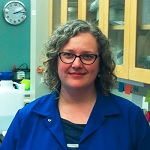 |
| UC Santa Cruz's Carrie Partch |
Focusing on the swelling body of evidence that suggests a link between circadian rhythms and cancer, a researcher at the University of California, Santa Cruz has zeroed in on one particular protein that may help illuminate new drug targets in the field.
Working with collaborators at the University of Oxford, Professor Carrie Partch at UC Santa Cruz focused on PASD1, which is included in a group of proteins known as "cancer/testis antigens" that have been considered as a potential target for therapeutic cancer vaccines as well as a disease biomarker.
According to Partch, PASD1 plays a role in governing the body's master biological clock. PASD1 shuts off the clock "very efficiently, she says, by interfering with two proteins--CLOCK and BMAL1--that create a complex that in turn switches the Period and Cryptochrome genes on.
In her lab experiments, Partch demonstrated that by blocking the protein, you could get the clock machinery to work normally again. And that has implications not only in cancer, in which circadian rhythm is associated with cell division, but also diseases like diabetes and heart disease.
This is very early preclinical research, but Partch believes that this particular pathway and the whole field of circadian rhythm research has real long-term promise.
"By understanding what makes the clock tick and how it is regulated, we may be able to identify points where we can intervene pharmacologically to treat disorders in which the clock is disrupted," she said. "The clock is not always disrupted in cancer cells, but studies have shown that disrupting circadian rhythms in mice causes tumors to grow faster, and one of the things the clock does is set restrictions on when cells can divide."
- here's the release